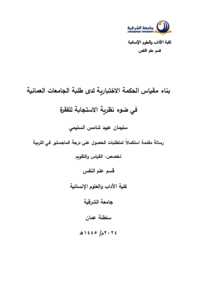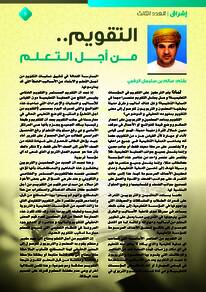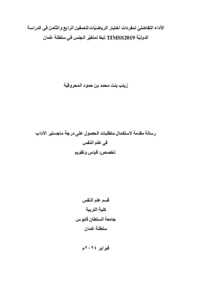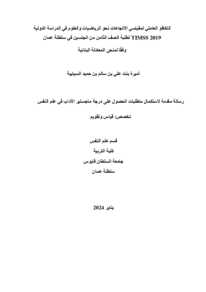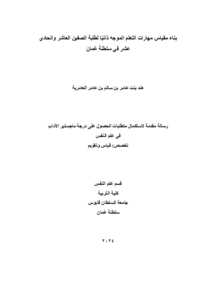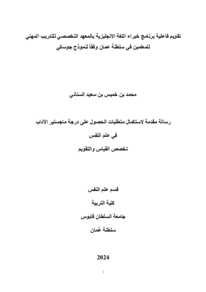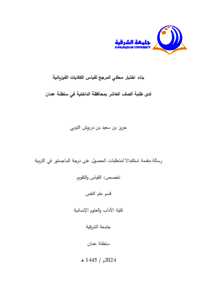وثيقة
بناء مقياس الحكمة االإختبارية لدى طلبة الجامعات العمانية في ضوء نظرية االإستجابة للفقرة.
المصدر
رسالة ماجستير
الدولة
عمان.
مكان النشر
إبراء
الناشر
جامعة الشرقية
ميلادي
2024-04-15
نوع الرسالة الجامعية
رسالة ماجستير
الملخص الإنجليزي
The study aimed to constructing a wisdom test scale among Omani
university students, and to verify its psychometric properties in view of
item response theory in accordance with the assumptions of the Andrich
model. To achieve the objectives of the study, the researcher relied on the
descriptive approach, and an experimental wisdom scale consisting of (60)
items was constructed, which was applied to a sample of (719) university
students: Sultan Qaboos, Al Sharqiyah, and Nizwa. The results of the study
reached the following: The items of the test wisdom scale prepared in the
study conformed to the assumptions of the Andrich model, which are the
internal and external correspondence of the items, the correlation of the
items with the scale, positional independence, and the equality of the
discriminatory ability of the items. Except for six items that did not achieve
the specified correlation coefficient with the scale, and three items that did
not meet the assumption of differential performance of the items. These
items were deleted, so that the scale in its final form consisted of (51)
items. The results also indicated that the values of the reliability
coefficients for the scale reached (0.99, 0.92) for the items and individuals,
respectively, while the values of the separation coefficients for the scale
reached (11.86, 3.42) for the items and individuals, respectively, which are
high reliability and separation coefficients. As for the results of the analysis
of the calibration of the scale categories according to five criteria, all
results indicated that the scale is effective in grading its items.
Consequently, all items of the scale were preserved, and the measurement
of the categories increased at a steady pace when moving from one
category to another, and the distance between the grading categories fell
within the required range. In view of the previous results, the study
recommended using the experiential wisdom scale, whose psychometric
properties were constructed and verified in this study, in other studies and
research related to experiential wisdom.
Keywords: Test Wisdom, Item Response Theory, Andrich's Model
الملخص العربي
الدراسة تهدف إلى إنشاء مقياس اختبار الحكمة بين طلاب الجامعات العمانية، والتحقق من خصائصه النفسية باستخدام نظرية استجابة العنصر وفقًا لافتراضات نموذج أندريتش. لتحقيق أهداف الدراسة، اعتمد الباحث على النهج الوصفي، وتم بناء مقياس الحكمة التجريبي الذي يتألف من 60 عنصرًا، وتم تطبيقه على عينة من 719 طالبًا من جامعات سلطنة عمان: جامعة السلطان قابوس، والشرقية، ونزوى. أظهرت نتائج الدراسة ما يلي: تطابق عناصر مقياس اختبار الحكمة المعد في الدراسة مع افتراضات نموذج أندريتش، مثل التوافق الداخلي والخارجي للعناصر، والترابط بين العناصر والمقياس، واستقلالية الموضع، ومساواة قدرة التمييز بين العناصر. باستثناء ستة عناصر لم تحقق معامل الارتباط المحدد مع المقياس، وثلاث عناصر لم تفي بافتراض أداء العناصر التفاضلي. تم حذف هذه العناصر، بحيث بلغ عدد العناصر في النموذج النهائي 51 عنصرًا. كما أشارت النتائج أيضًا إلى أن قيم معاملات الثبات للمقياس وصلت إلى 0.99 للعناصر و0.92 للأفراد، بينما وصلت قيم معاملات الفصل للمقياس إلى 11.86 للعناصر و3.42 للأفراد، وهي قيم عالية لمعاملات الثبات والفصل. بالنسبة لنتائج تحليل معاير المقياس وفقًا لخمسة معايير، أشارت جميع النتائج إلى أن المقياس فعال في تصنيف عناصره. ونتيجة لذلك، تم الاحتفاظ بجميع عناصر المقياس، وأظهرت قياسات الفئات زيادة ثابتة عند التحرك من فئة إلى أخرى، وسقوط المسافة بين فئات التصنيف ضمن النطاق المطلوب. بناءً على النتائج السابقة، أوصت الدراسة باستخدام مقياس الحكمة التجريبي، الذي تم إنشاؤه والتحقق من خصائصه النفسية في هذه الدراسة، في دراسات وأبحاث أخرى تتعلق بالحكمة التجريبية.
قالب العنصر
الرسائل والأطروحات الجامعية

